‘This success should motivate us all’
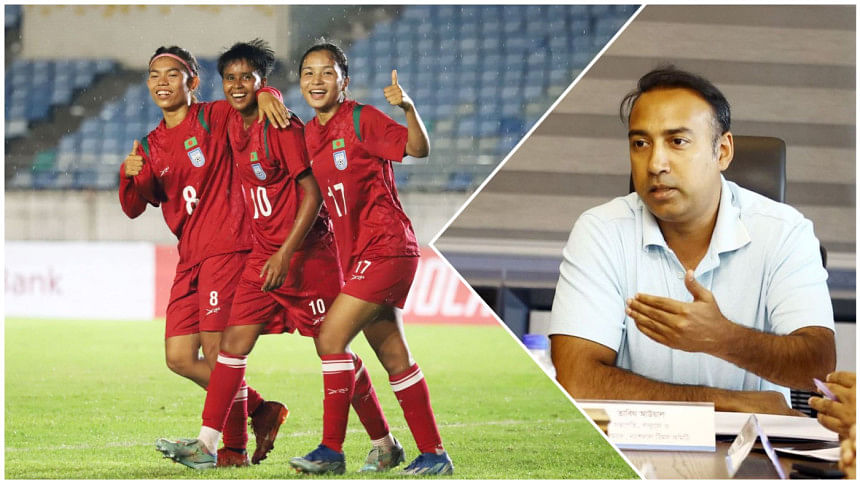
After Bangladesh women's football team's historic qualification for the AFC Women's Asian Cup in Australia, questions are being asked about whether the Bangladesh Football Federation (BFF) can turn this moment into long-term progress. In this exclusive interview with The Daily Star's Anisur Rahman, BFF President Tabith Awal addresses the challenges, plans, and prospects for the women's game.
The Daily Star [DS]: How does the BFF view the women's team's historic qualification for the AFC Women's Asian Cup?
Tabith Awal [TA]: Firstly, we're not playing football beyond expectations. Rather, it is the result of the modern and analytical preparation we have undertaken. Now, we study the opponents in depth; we also analyse our own players' abilities and capacities extensively. I feel the team is playing at the level Bangladesh should expect. All credit goes to the girls, especially for the way they have fought — both physically and mentally. We often fixate on the FIFA ranking of opponents, but this qualification is not a miracle. It is the outcome of practice and technical preparation by Bangladesh.
DS: How does BFF plan to capitalise on this opportunity?
TA: We want to make use of this opportunity in two or three ways. Firstly, it's time for individuals to get chances in good international leagues, either in Asia or Europe, and I believe we have a few players who are at that standard. Secondly, we aim to attract more sponsorships and branding and gain the government's attention. If the government invests in women's football, the country can achieve even better results. Thirdly, the federation previously did not give this matter enough attention — I admit my own failure in this regard — particularly concerning the women's league. We don't yet have a structured format of competition. I hope this qualification inspires us and makes our job easier. Finally, we need a dedicated women's football complex that includes youth training, elite training, and a physio centre — especially given the volume of matches women players are now playing.
DS: Does this qualification show Bangladesh have gone beyond South Asia in women's football?
TA: I think many people speak overconfidently without understanding the reality. Other South Asian teams are not far behind Bangladesh. We are still the best team in the region for technical and tactical reasons — we are the defending SAFF champions. India have also qualified for the Asia Cup, while Nepal only lost on penalties. Nepalese strikers scored the most goals by far, and Bhutan are also performing well in their campaign. So, we must recognise that all teams in the region are progressing. What worked for us in the past will not bring the same results in the future. To keep improving, we must adapt and work in new and different ways.
DS: How challenging is it for BFF to maintain year-round women's training?
TA: I think all credit goes to the players, because they stay in difficult environments and still show great dedication. Unfortunately, our training style has almost become like a North Korean model — like a military camp. It produces results, but it's not sustainable. To make it sustainable, we must shift to a league-based system — that is our main goal. Right now, since we've qualified for the Asia Cup — which also serves as qualification for the World Cup and Olympics — keeping the players in camp is the best way to prepare for 'Mission Australia'. But after the Asia Cup, we must move to a long-term sustainable plan — away from relying on one coach, one building, and a handful of players.
DS: What is BFF's sustainable plan for women's football?
TA: As I said earlier, we will organise a women's football league. We'll also support BKSP in expanding women's football activities at its various branches. We are trying to bring two women's cadet colleges into the fold and support Army, Police, and other services teams in forming women's football squads. That way, we can build a strong pipeline for women's football, and also increase access to playgrounds.
DS: Why has there been little visible progress since the SAFF triumph?
TA: There are many invisible things that affect performance, which we don't often talk about. Firstly, we placed significant emphasis on women's equipment — boots, jerseys, and more — which impacts performance. Secondly, we organised friendly matches, which gave the girls confidence and allowed tactical development. Another important area is housing. It's time to provide a better off-field environment, which has a direct influence on performance. If we want to aim higher, the BFF must ensure good housing, nutritious food, and a well-equipped gym — all customised to women's needs.
DS: How will BFF address the players' demands for better facilities and friendlies ahead of the Asian Cup?
TA: We have repeatedly appealed to the present and past governments, the Ministry of Youth and Sports, and the National Sports Council to provide these facilities, but have yet to receive any tangible support — only promises. We haven't received financial aid, a dedicated field, or housing. The government could allocate just one of the 64 district stadiums. Even guest houses from the tourism corporation or other government organisations could be allocated as housing for female footballers. The funds we receive from FIFA and sponsors are spent mostly on tournaments, and meeting daily expenses for women's football has now become a challenge. Without meeting those expenses, we are forced to compromise on quality. So, we urgently need the government's help for a long-term solution.
DS: Has BFF formally submitted any proposals to the government for women's football?
TA: Yes, we have submitted our requirements in writing to the government. We requested funding for the women's team's airfare, but received nothing — forcing us to cover those costs ourselves. Members of the SAFF-winning team also wrote to the Honourable Chief Adviser following his suggestion, but we haven't seen any concrete results yet. Still, we haven't lost hope — but time is moving fast. I think everyone needs to pay attention to the players' needs.
DS: What has been the response from private sponsors?
TA: Dhaka Bank is supporting us significantly. Apart from them, a few other corporate houses have stepped forward on a short-term basis — helping with travel, friendlies, equipment, technical staff development, and players' salaries. However, these supports are non-sustainable. That's why we need long-term and sustainable support from the government.
DS: What do you mean by 'Mission Australia'?
TA: The message of 'Mission Australia' is simple. First, unite the whole nation behind the women's football team with the goal of achieving a good position in the AFC Women's Asia Cup in Australia. Second, it's a message to those who want to contribute — now is the time and this is the platform. I've already received a few letters and phone calls from Australian expatriates offering financial support. From now on, every action — whether it's international friendlies, training, technical staff development, or salary increases — will be aligned with our Australia-centred mission.
DS: What are BFF's plans for a strong and regular women's league?
TA: We need to find patrons who can run clubs sustainably, not on an ad-hoc basis. Institutions and clubs that can host residential camps should be identified, and BFF will support them. But the clubs must ensure their own financial sustainability. We aim to feature six to ten teams in the women's league and increase the number of matches over a four-to-six-month period. We need to be innovative — universities and boarding schools could also be part of the league. The BFF will facilitate and support participating clubs in every possible way.
DS: What are the concrete plans for the national team in the lead-up to the Asian Cup?
TA: Peter Butler has submitted several requirements and suggestions. The women's wing has drafted a plan, and our research team has produced a white paper comparing what other member associations are doing for the Asia Cup. The players themselves also submitted their ideas and demands. We'll combine all three and finalise our own plan of action. We are currently waiting to see which group we fall into before sealing the final plan.
DS: Why does BFF struggle with timely salary payments, and will players' pay be increased?
TA: We plan to improve compensation in two ways. First, by adding performance-based bonuses based on set parameters — giving players an extra source of income for good performance and discipline. Second, we want to help them get corporate endorsements, like Afeida Khandokar did with Robi.
It's unfortunate that salaries have been irregular, but that's because of a backlog. When we took charge in November, the August salaries were still unpaid, and we've been carrying that burden due to financial and cash-flow limitations. I hope the situation will stabilise in the next two to three months.
DS: Will the five players in Bhutan's league be considered for the national team?
TA: Honestly, we've moved past what happened last February. We don't consider any players as rebels. The BFF has 54 contracted players — all of whom are eligible for the national team at any time. We always want to field the best eleven based on discipline, fitness, and form. It's not about who isn't playing — the focus is on ensuring all 54 are ready to play when called upon.

 For all latest news, follow The Daily Star's Google News channel.
For all latest news, follow The Daily Star's Google News channel. 

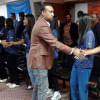

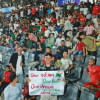

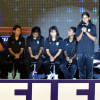

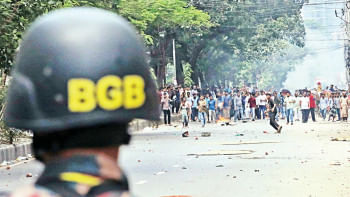
Comments